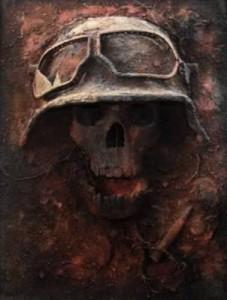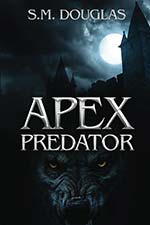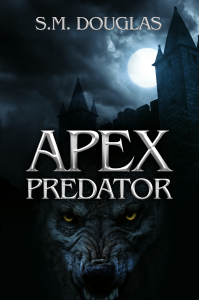I have previously examined several issues horror writer’s must address in their work. This week I offer further tips to aspiring authors, as well as bonus backstory for fans interested in the mass grave at the heart of Apex Predator’s pages.
For those that haven’t yet picked up a copy of my book, it features two sets of investigators whose work brings them together. One set of investigators is actually a group of researchers exhuming a mysterious Eastern European mass grave. Found in a foreboding heavily forested valley, the mass grave contains what appears to be an entire squad of Second World era German soldiers. The researchers, who comprise several of the book’s primary characters, struggle to understand how and why these German soldiers ended up in such a grave miles from any known WWII battlefields; albeit located in the heart of Europe’s bloodlands.

As part of the investigative process these researchers (a group of historians, historical archeologists, and one dogged forensic biologist) form a site plan to determine their methodology. This initial process is only alluded to, as it would have slowed down Apex Predator’s pace to have been described in detail.
In planning how to exhume the human remains our researchers are motivated by one early concern: getting initial impressions of the bones without unduly disturbing the state in which they were found. For that reason, as well as the fact Apex Predator’s researchers were dealing with relatively few bodies, they chose a stratigraphic method for excavating the grave. Unlike using, say a pedestal methodology, a process that starts the dig at the grave’s perimeter, working in, and collapsing the grave walls – the stratigraphic approach allowed the researchers to excavate in reverse order. They could thus exhume the bodies beginning with the remains closest to the surface then moving down to the deceased first put in the grave when it had been originally formed. Not only does this provide insight into the process behind the grave’s creation, but via maintaining intact the site walls the researchers could also better identify those elements that created the grave – such as marks from tires or the types of tools used.
Note to aspiring authors; this is swiftly discussed in the book. I didn’t want to turn this explanation into a proverbial “info dump”. In horror writing, and in contrast to non-fiction, it’s more important to keep the tension and suspense high – as well as to keep the story moving. To that end I also trimmed up passages from the manuscript’s initial drafts that went into detail concerning the type of equipment used to uncover and analyze the remains.
However, I also want readers who enjoyed my book to have a source where they can learn more about what was going on “behind the scenes”. As such, note that Owen (a historian and one of the book’s main characters) found a particularly important (as it would turn out) human femur. In the book we see him uncover it, but we don’t know how he removed it from the ground without damaging it. Here is what he did. Once Owen realized he had found a potential human remain he progressively switched to several different brushes to feather free the remains. This included a hand brush manufactured with soft coco bristles capable of moving significant quantities of loose soil that, nevertheless, was still a rather blunt instrument. For greater precision Owen also used a small ox hair artist’s brush that, with its even softer bristles, would allow him to work without fear of damaging the femur’s cylindrical shaft, spherical head, collum, trochanters, and two stubby condyles that provided the structural basis for the bone’s integration with the knee joint.
In Apex Predator’s pages Owen turns the femur over to Cindy (another main character and our forensic biologist), who has set up a field lab at the dig site. The field lab’s interior layout is partially described in the final manuscript. Initial drafts had provided more detail but, and another tip for aspiring authors, I had cut most of that because the lab did not feature as a prominent physical location in the book. It was an important location, but not enough that I needed to spend several paragraphs describing it. This is a point many authors forget. When you spend time describing a place to readers you are signaling that it will be crucial for the story. If it subsequently is not, then you have wasted the reader’s time. In Apex Predator, the town of Dibrovno, it’s castle, the valley surrounding it, and several other places are described in lavish detail – but that’s because they are critical locations to the story. Please, strive to avoid wasting the reader’s time.
As for my dear readers, who might be looking for more about the world in which Apex Predator unfolds, let’s take a closer look at Cindy’s field lab. On the outside it was a huge canvas tent, with special access doors to limit the chance of contaminants getting inside. The interior featured gleaming stainless steel tables on top of which a series of pans had been set and labeled in order as follows; detergent, 5% bleach, sterile distilled water, and 100% ethanol. These materials were used to help clean the bones for analysis. A rack allowed remains to air dry in place. Dremel multi-function rotary tools with attached grinding stones could also have been used to sand from the bones any soil and remaining tissue not sampled for DNA evidence and subsequently stored in a custom deep freezer. The results of Cindy’s research, particularly into DNA fragments pulled from the remains, form part of a key conversation in the book’s first act.
Organizational skill and analytical ability was supposed to be the research team’s edge, allowing them to identify how and why the German soldiers had ended up in a mass grave. Nonetheless, the plan fell apart. One of the issues stumping the research team revolved around the reality that the more remains they took from the grave the fewer secrets it gave up. Most problematically, there had been no signs of tool usage. How did the bodies get there? Moreover, there was a total absence of ballistic or projectile damage on the remains. This begs the question as to how an entire squad of murderous, well-armed Nazi soldiers ended up meeting their demise. It was as if the bodies had been dropped into a pre-existing hole, with no explanation as to what had killed them. The reader ultimately gets a first hand look at how that happened. Of course, the researchers would end up getting their answers as well – but for them it would occur in the most horrifying way possible.







Recent Comments